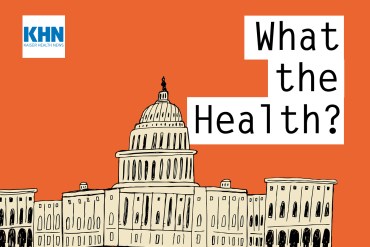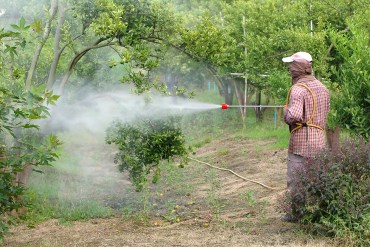Must-Reads Of The Week From Brianna Labuskes
Newsletter editor Brianna Labuskes wades through hundreds of health care policy stories each week, so you don’t have to.
Podcast: KHN’s ‘What The Health?’ Is ‘Medicare For All’ Losing Steam?
Joanne Kenen of Politico, Stephanie Armour of The Wall Street Journal and Kimberly Leonard of the Washington Examiner join KHN’s Julie Rovner to discuss the latest Democratic efforts to push “Medicare for All” in the U.S. House. They also review new initiatives to raise the federal minimum age to purchase tobacco to 21 and new lawsuits challenging the Trump administration’s actions on reproductive health. Also, for extra credit, the panelists suggest their favorite health policy stories of the week they think you should read, too.
Calor extremo y violencia, más amenazas para los que esperan asilo en la frontera
Ya no son hombres solos en busca de trabajo. Familias enteras buscan asilo en los Estados Unidos, y deben esperar en refugios atestados y zonas de violencia al sur de la frontera.
Heat And Violence Pose Twin Threats For Asylum-Seekers Waiting At Border
For Central American migrants who follow U.S. government rules for pursuing asylum, conditions on the Mexican side of the border are sweltering, filled with anxiety and illness. Few people have a clear timetable for when it will get any better.
A Medical Sanctuary For Migrant Farmworkers
A former farmworker, now a doctor, runs two clinics in California’s Central Valley providing care — often free of charge — for migrants who don’t have money and are deeply worried about the federal government’s hard-line stance on immigration.
Escalada de violencia contra trabajadores de salud conmociona a los hospitales
Presionan a centros de salud a tomar más medidas de seguridad para prevenir una forma de violencia que ha sido considerada por largo tiempo como “parte del trabajo”.
Opioid Prescriptions Drop Sharply Among State Workers
New data from the California agency that manages health benefits for 1.5 million public employees, retirees and their families shows that doctors are writing far fewer opioid prescriptions, reflecting a national trend of physicians cutting back on the addictive drugs.
Why Missouri’s The Last Holdout On A Statewide Rx Monitoring Program
For the seventh year in a row, Missouri will retain its lonely title as the only state without a statewide prescription drug monitoring program. Fears about privacy violations and gun control scuttled the bill yet again, leaving a pastiche of half-step measures in place to fill the void in the fight against prescription drug abuse.
Escalating Workplace Violence Rocks Hospitals
Incidents of serious workplace violence are four times more common in health care than in private industry, according to the Occupational Safety and Health Administration.
Must-Reads Of The Week From Brianna Labuskes
Newsletter editor Brianna Labuskes wades through hundreds of health care policy stories each week, so you don’t have to.
How To Find And Use New Federal Ratings For Rehab Services At Nursing Homes
For the first time, the federal government is measuring the quality of rehab services in nursing homes for the millions of older adults who need post-hospitalization care.
Walmart Charts New Course By Steering Workers To High-Quality Imaging Centers
Walmart, the nation’s largest private employer, is recommending that employees and dependents use one of 800 imaging centers identified as providing trustworthy care.
Dealing With Hospital Closure, Pioneer Kansas Town Asks: What Comes Next?
After depending on the local hospital for more than a century, Fort Scott residents now are trying to cope with life without it.
Newsom Changes Course On Plan To Pay For Immigrant Health Coverage
California’s governor Friday scuttled his plan to siphon public health money from four counties to help provide health coverage for unauthorized immigrants ages 19 through 25.
Newsom cambia de idea sobre plan para pagar por cobertura de salud a inmigrantes
La administración de Newsom escuchó los reclamos de cuatro condados y decidió cambiar el curso. Usará dinero de las arcas estatales para cubrir a esta población, de aprobarse su presupuesto.
Must-Reads Of The Week From Brianna Labuskes
Newsletter editor Brianna Labuskes wades through hundreds of health care policy stories each week, so you don’t have to.
State Bans Pesticide Linked To Developmental Problems
California officials announced a ban on chlorpyrifos, a widely used pesticide that has been linked to lower IQs, lower birth weights and other developmental issues in children, even as the federal government fights to protect it.
California prohíbe pesticida vinculado a problemas de desarrollo
Varios estudios han relacionado la exposición prenatal al clorpirifos con bajo peso al nacer, reducción del coeficiente intelectual, trastorno por déficit de atención y síntomas del autismo en niños.
Needle Exchanges Find New Champions Among Republicans
More Republicans, at the statehouse level, are saying research and results support their endorsement of a once-controversial plan to limit disease among drug users.
Addiction Medicine Mostly Prescribed To Whites, Even As Opioid Deaths Rose Among Blacks
A study looked at who gets Suboxone prescriptions and found that whites are almost 35 times more likely to get the addiction treatment than African Americans.





















